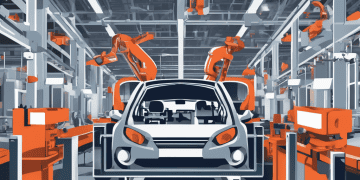LAS VEGAS (Reuters) – Global auto suppliers are evaluating the potential for moving production to the United States or closer to it in response to tariffs proposed by President-elect Donald Trump. This shift is being discussed by industry executives at CES in Las Vegas.
The auto industry has already experienced significant protectionism over the past eight years, with tariffs imposed or threatened during Trump’s first term, followed by additional tariffs under President Joe Biden. Many of these measures have focused on China, including a proposal by the Biden administration to restrict Chinese software and hardware in U.S. vehicles.
Trump has pledged to go further, with a blanket tariff of 10% on global imports and a higher 60% tariff on Chinese goods. He also announced plans for a 25% tariff on imports from Canada and Mexico starting in January 2025. Such high tariffs would make many auto parts produced in lower-cost markets economically unfeasible or difficult to sell in the U.S.
As a result, several suppliers are exploring options for shifting production to alternative locations such as Mexico or Brazil, where they already have facilities. However, many companies are awaiting confirmation of the new tariff policies before making significant decisions.
Throughout his first term, Trump used the threat of tariffs to encourage automakers to increase U.S. production. This led to changes such as Toyota’s decision to build a $1.6 billion joint plant with Mazda in Alabama, replacing earlier plans to produce the Corolla in Mexico.
In response to U.S. protectionism and disruptions caused by the coronavirus pandemic, many suppliers have localized production to minimize risks related to border taxes and supply shortages. This trend has been further accelerated by the Biden administration’s Inflation Reduction Act, which incentivized suppliers to invest in the U.S. market. The incoming Trump administration, however, has signaled its intent to dismantle parts of the law.
As part of their strategy, companies like Continental are examining options to source components from North America to avoid potential tariffs. Some suppliers are also considering shifting production locations, such as Honda, which may move some production away from Mexico depending on the tariff levels.
The potential for high tariffs on Chinese goods has pushed some suppliers, such as Panasonic Energy, to further localize their supply chains. The company, which provides EV batteries to Tesla, is working to reduce its reliance on Chinese materials in its U.S.-made batteries.
Many suppliers are still in the planning stages, carefully considering the potential impact of the tariffs on their operations and supply chains.
Your go-to source for supply chain logistics news updates: The Supply Chain Report. Enhance your international trade knowledge at ADAMftd.com.
#AutoSuppliers #TariffImpact #ProductionShift #TradePolicy #SupplyChainChallenges















